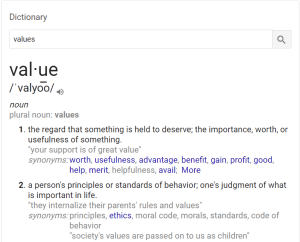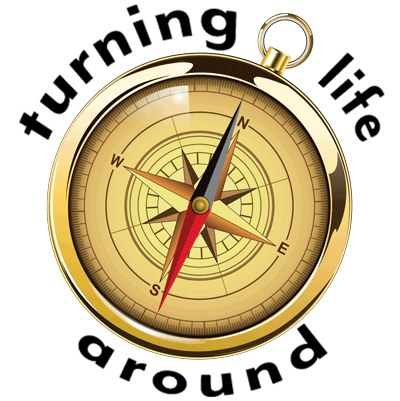“Value Realization” is the realization of your values. I know, profound right? Seriously, take 60 seconds and quickly list your top 10 values in priority. Most people have a hard time understanding what values are, let alone knowing their own? Values have lost their prominence in society these days. Values are not typically taught forthright in today’s society. Values are generally acquired or adopted based on our environment. Key influences to our values are: family, culture, religion, school, hobbies, television, other media exposure and our experiences. Values are important for us human beings because without them, we would all be like leaves in the wind. Blowing around aimlessly, getting pissed off when another leaf ran into you or stole the spot you were going to land in. Values are the things that make you, who you are. Values are the core of our human essence. Values, when put into action make-up your virtues and your virtues define your morality. Our values are instrumental in choosing between right and wrong, creating meaning or purpose in our lives, establishing healthy boundaries, finding a life partner, your career, lifestyle, etc. Up until this point, you probably have been content operating with the values you adopted or have never given any thought to the values you want or need? If you aspire to reach your full human potential before you depart your existing body, you need to spend some time thinking about what’s important to you, understanding your values and making them a priority. Begin by determining which are real, then how they affect your decisions and finally, which ones you will consciously manage to reach your full human potential.
Let’s begin with the basics, a definition for Values from google:
 For this conversation, we’ll use the second definition: “A person’s principles or standards of behavior, one’s judgment or what is important in life”. The key words here are “what’s important in life”. They’re key because they support the first definition that says we as human beings “will do what we see value in doing or what we find valuable”. I understand this is a circular reference but, stay with me. How can you determine what’s important in life if you don’t know your true values? How can one live a valuable life if one doesn’t know what’s important to oneself? If we only do what we find value in, shouldn’t it be what you find most important? My point is, if we want to evolve as a species we need to consciously make values a priority.
For this conversation, we’ll use the second definition: “A person’s principles or standards of behavior, one’s judgment or what is important in life”. The key words here are “what’s important in life”. They’re key because they support the first definition that says we as human beings “will do what we see value in doing or what we find valuable”. I understand this is a circular reference but, stay with me. How can you determine what’s important in life if you don’t know your true values? How can one live a valuable life if one doesn’t know what’s important to oneself? If we only do what we find value in, shouldn’t it be what you find most important? My point is, if we want to evolve as a species we need to consciously make values a priority.
I believe most people espouse to good values. There are no right or wrong values and they align to your core essence. I’m not going to publish a list but, here is a link to a list of Core Values Value List that you can use for reference. (please remember to come back and finish reading this).
The key is understanding your values and then giving them priority and meaning in your life. There is no magic pill or silver bullet to finding your core values. Identifying and validating your values takes a little bit of time but, it’s well worth it if you want to do what’s important to you. Identifying your values is pretty easy. Go to one of the list of core values referenced, write down the ones that “feel” right to you, then prioritize them. To prioritize, ask yourself how important you think this value is to living the life you want? The part that takes time is validating these. Validation requires rigorous honesty to verify which values you are actually living? A good way to study this is being conscious of your judgements. Your judgements are a mirror to your values. For instance, you are walking down the street and see an obese person eating ice cream. If your judgement is that of disgust, then you might say, you value healthy living or being slim or eating right. Here’s the litmus test: With rigorous honesty, how does this align to your Truth? Are you thin, do you prioritize eating healthy, do you work out as often as you’d like or believe you should? If the answer is yes, then this is a legitimate value. If it’s not, then this is an opportunity to explore that judgement. What is the origin of that thought or thinking? What does this false belief tell me about myself? How would I like to think in that situation and why? Maybe this is an opportunity to exercise newly prioritized values like, compassion, sympathy, empathy, grace, etc. Being conscious of these judgements is a great first step to understanding your values. Start keeping a score card of your values and ask, is this value bringing joy or regret to my life?
Values are the foundation for healthy boundaries and effectively maneuvering through life. Prioritizing your core values is key for this. For instance, knowing that “consideration” is a core value would allow you to set up your response plan (boundaries) with “inconsiderate” people. Instead of “flying off the handle” and reacting poorly when your loved one talks to you with their mouth full of food, you can make a plan to respond “considerately” to that person. This is a prime example of a virtue or “living your values”. I’m not going to presume to know how you should respond. I’m confident you will come up with some good ideas and create a thoughtful plan. Prioritizing your top 5 values and establish a boundary plan for living these has the potential to change your life because you are now living with integrity by doing what you decided was important to you. If you learn to manage the first five, move on to the next five and so on.
Living your values eliminates any conflict with morality. It’s when we are not living our values that we find ourselves in moral conflict, which inevitably leads to feelings of guilt, remorse, shame, fear, resentment, sadness, anger, etc. To live a virtuous life, we must know our values and how they integrate into our lives.
Can you change your values? The answer is “yes”. Changing your values requires a conscious effort on your part. Values are a belief system, virtues are those values in action and morality is the compilation of those beliefs and their governance. Changing a value requires that you change a belief. We do this unconsciously all of time. It’s how we grow emotionally and adjust to the changing conditions in our life. The opportunity here is to question whether you want your values to reflect your life or your life to reflect your values? The choice is yours !
Contact me if you want to learn more about values, explore your own values or if you would be interested in attending a Value Realization workshop.


Recent Comments